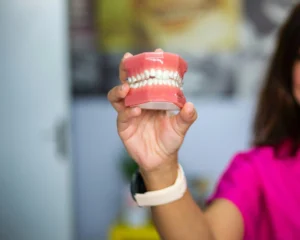Dental implants are a new approach in implant dentistry to address the issue of missing teeth. Dental implant placement stimulates bone formation and bonding with organic surrounding bone and mass which supports the prosthetic teeth. Compared to traditional dentures, dental implants are more effective and feel like natural teeth because they are fixed to the implant body, just like real teeth.
Types of dental implants
In implant dentistry, there are many different options for replacing the missing teeth with dental implants as follows.
Single Tooth Restorations:
These single-piece units replace one missing tooth without attaching to other teeth or implants. Dental implant therapy involves surgery where an oral surgeon inserts the implant into the jawbone. After the implant bonds to the bone, a crown or artificial tooth is placed on the implant to restore appearance and functionality.
Implant-Supported Bridges (or Fixed Dentures):
This type of dental implant involves the placement of a set of teeth that is fixed on dental implants to ensure that the user cannot remove it. This dental implant procedure is ideal for filling the gaps of several missing teeth in a line. The implant-supported bridge recreates the chewing efficiency of natural dentition and helps prevent the overload of implants that may cause implant failure.
Removable Implant-Supported Dentures (also known as Implant-Supported Overdentures):
This option involves a prosthesis that can be taken out and is used when several teeth are missing. During the dental implant surgery, the surgeon installs the implants into the jawbone and these serve as support for adjacent teeth and the overdenture. It is removable for cleaning but the implants hold the denture in place thus improving the comfort and functionality of the fixed denture.
Benefits of Dental Implants
Dental implants have numerous advantages that set them high among the other teeth replacement options and methods.
Natural look and comfortable fit, similar to natural teeth
Dental implants are created to be aesthetically appealing, comfortable, and functional. It appears natural and has a comfortable fit, which is such a good value for the long term and is a great investment in oral health.
Long-lasting and reliable, with a high success rate
With proper care, dental implants are durable and stable, often lasting longer than standard dentures or other replacement methods. Studies show that well-planned and maintained dental implants have excellent survival rates compared to similar options.
Dental Implant Surgery
Main surgical procedures for dental implant surgery
Dental implantation typically occurs in several phases and requires significant healing time between them. From surgery to final prosthesis installation, the process can take three to eight months to ensure proper bone healing and integration.
Additional procedures to augment deficient bone in the implant site
At times, complementary operations are required to provide sufficient bone in the area of the implant to guarantee a reliable anchor point for the dental implant. One of the most frequently used and efficient methods of stimulation is bone grafting. Bone grafting is required if the jawbone is too soft, or its thickness is insufficient to accommodate the implant since it is necessary for implants to have sufficient bone support.
Candidacy and Suitability
Who is a candidate for dental implants?
Dental implants are recommended for individuals with a poor smile due to missing teeth or damaged teeth. In most cases, anyone who has one tooth root or several missing teeth can opt for dental implants provided one is medically fit to undergo a procedure such as tooth extraction or root canal treatment.
What if I have missing teeth or bone loss?
If a dentist tells you that you cannot receive dental implants because of bone loss, it is recommended to consult with another dentist. Modern dental care technologies and regenerative surgeries, including dental bone grafts and sinus lifts, generally can manage the loss of bone tissue and enable dental implants.
Dental bone grafts entail the use of bone grafts in the implant site to enhance the strength of the implant while sinus lifts involve the placement of new bone specifically in the molar and premolar regions of the upper jaw. These procedures can improve bone density to a great extent, preserve bone, and make it easier to place dental implants where the teeth are missing. Consequently, the fact that you have bone loss does not necessarily disqualify you from receiving dental implants or the advantages that come with them.
Are dental implants painful?
Dental implant placement involves surgery that entails some pain and swelling; however, you can control these symptoms with adequate care and medications. During the procedure, the dentist installs an implant in the area to replace missing teeth with replacement teeth or dentures. After surgery, the patient usually feels pain and swelling, but simple pain relievers such as NSAIDs, including Ibuprofen, can easily relieve these symptoms.
In order not to aggravate the situation, there is the advisability of refraining from rigorous activities such as doing exercises and visiting the gym for a few days. Proper oral care should be maintained to avoid additional problems that may set in during the recovery period.
Are dental implants safe, and what are the potential risks and complications?
A proficient and experienced surgeon can perform dental implant surgery safely. However, as with any surgery, certain risks and side effects are involved. The formation of the osteotomy or placement of the implant may cause sensory impairment, affecting nerves such as the inferior alveolar nerve, maxillary sinus, and blood vessels in the region.
It may cause problems like numbness of the limbs, problems with the sinuses, or excessive bleeding. Further, having poor oral hygiene habits weakens the immune system putting the patient at a high risk of getting infected at the implant location which may lead to implant failure. Nevertheless, the success rate of such surgeries is high, especially when it comes to specially trained dentists, who would not only plan the implantation carefully but also would closely watch the progress of his/her patient.
Post-Operative Care and Recovery
Do dental implants require special care and maintenance after surgery?
Dental implants just like natural teeth have to undergo some routine care and maintenance to enhance their durability and efficiency. Cleansing and oral hygiene are significant to ensure that there is a healthy implant area and healthy gums around the implant. Brush and floss prosthetic teeth as you would normal teeth to avoid plaque accumulation and infection at the implant site. If you have a dental implant-supported prosthesis, including artificial or prosthetic teeth, follow additional oral care measures.
Proper maintenance is crucial for dental implants to prevent infections and ensure their success, similar to removable dentures. By strictly following your dentist’s care instructions, your implants are likely to remain functional and aesthetically appealing for years.
How to ensure the longevity of your dental implants?
To ensure the longevity of your dental implants, it’s essential to maintain excellent oral hygiene, similar to the care you would provide for natural teeth. Regular brushing and flossing are crucial for keeping both the implants and their supporting restorations in optimal condition. Brushing twice a day with fluoride toothpaste helps remove plaque and prevent gum disease around the implant site.
Daily flossing is equally important to clean between the implants and remove any food particles or plaque buildup. Additionally, consider using antimicrobial mouthwash to further reduce bacteria and support gum health. Regular dental check-ups are also important, as your dentist can monitor the condition of the implants and address any potential issues early on. By adhering to these practices, you can help ensure that your dental implants remain stable and functional for years to come.
Long-Term Results and Expectations
How long will my dental implants last?
Dental implants usually have a long life expectancy, especially with proper care and regular dentist visits. They boast a high success rate of 90% to 95% for those without medical or dental issues who maintain good oral hygiene. The longevity of implants depends on the type of surgery and the recipient’s health. Routine dental checkups are essential for monitoring the implants and addressing any complications.
Key Factors for Longevity of Dental Implants:
- Good Oral Hygiene: Regular brushing and flossing to prevent plaque buildup and gum disease.
- Routine Professional Check-Ups: Regular dental visits to monitor implant health and address any issues.
- Healthy Bone Structure: Ensuring adequate bone growth and addressing any bone loss with procedures like bone grafting if needed.
- Proper Care of Prosthetic Teeth: Maintaining the cleanliness and condition of dental crowns and other components attached to the implant.
- Avoiding Risk Factors: Managing conditions like gum disease and avoiding habits that could impact implant success, such as smoking.
Ideal Smiles of Stamford: Your Premier Choice for Dental Implants
At Ideal Smiles of Stamford, we specialize in providing top-notch dental implant services that restore both function and aesthetics to your smile. Our expert team utilizes the latest technology and techniques to ensure a comfortable and successful implant experience. From single-tooth restorations to full arch solutions, Ideal Smiles of Stamford offers personalized treatment plans tailored to meet your unique needs. Schedule your appointment today and discover how our expertise can help you achieve a healthy, beautiful smile.
FAQ
How much does a dental implant cost in the USA?
Although the cost for dental implants can vary depending on a particular case, dental implants usually cost anywhere from $1,500 to $5,000.
How long does a tooth implant last?
Usually dental implants last between 20-25 years. Likely, a person’s implant will probably stay in their system until he or she regains it.
How painful is getting a dental implant?
A straightforward implant of bone has a pain level of 2 or 3 and can cause pain within the first 12-24 hours.
Conclusion
Dental implants represent a significant advancement in modern dentistry, offering a reliable and aesthetically pleasing solution for missing teeth. Their ability to mimic the natural look and function of real teeth makes them an attractive option. With various types of implants available—ranging from single tooth restorations to full arch solutions—patients have the flexibility to choose a treatment that best suits their needs.






